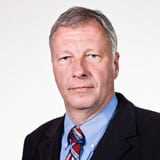Day four in the Russian war against Ukraine. And the escalation spiral continues dangerously: Russia’s President Putin announced in the afternoon that he had put the nuclear armed forces on alert. Fredy Gsteiger classifies the risk potential.
SRF News: What do Putin’s statements mean in concrete terms?
Fredy Gsteiger: President Putin speaks of a special combat mode. However, it is evident that in Western capitals it is not entirely clear what he meant by that. Some media have interpreted his statements as if the nuclear forces were on high alert. That is probably not true, but it is clear that Putin is continuing to escalate. Earlier in the week he had threatened, in vague terms, with unprecedented consequences for the West. The American interpretation at the time was that this was a threat, but that there was no sign that the armed forces were being put on high alert. But now that is exactly what is happening.
Both sides know that they could destroy the other side umpteen times if they wanted to. But nobody talked about that.
Of course, this would make it more likely to be used, and it would also be quicker to do. The hurdles are getting deeper. However, it is also unclear whether Russia is referring to its tactical nuclear weapons, i.e. nuclear weapons with a shorter range, which could be used in Ukraine itself, for example. Or its strategic nuclear weapons, with which Moscow could also reduce Berlin, London, New York and Washington to rubble.
Does the West have to follow suit?
That’s not clear yet. Apparently the West was caught off guard by Putin’s announcement. There are verbal statements, verbal criticism. For example, by the American UN ambassador, Linda Thomas-Greenfield, who strongly condemned the announcement. By NATO Secretary General Jens Stoltenberg, who calls them dangerous and irresponsible. But militarily it is still unclear how the West intends to react. One hears from American officials that they want to analyze what Putin actually meant, what his move means. At the moment there is no one-to-one answer.
The nuclear weapons sector is currently in the most dangerous situation since the Cuban Missile Crisis, i.e. for decades.
There is hesitation in putting Western nuclear weapons, especially American ones, on higher alert. For decades, the principle applied that nuclear weapons should not be detonated, not even verbally. Both sides know that they could destroy the other side umpteen times if they wanted to. But nobody talked about that. And the big question in the western capitals is now: how rational is the Russian leadership in making decisions?
Does the risk of an incident, an unintentional escalation, also increase?
That is to be feared. Already in the past decades there have been numerous incidents and accidents involving nuclear weapons, some of which could only just be avoided. One was often close to the fact that something really serious had happened. The more nuclear weapons are handled – if they are shifted to delivery systems, missiles, submarines or aircraft – the greater the risk. And the risk is also greater the higher the political tensions and the more aggressive the rhetoric. That also increases the risk. The nuclear weapons sector is currently in the most dangerous situation since the Cuban Missile Crisis, i.e. for decades.
The conversation was conducted by Simone Hulliger.
